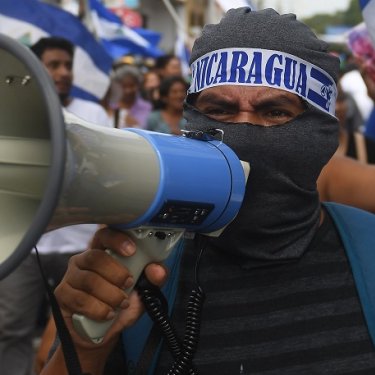Covering Nicaragua’s crisis getting more dangerous

Reporters Without Borders (RSF) condemns the serious press freedom violations that have accompanied Nicaragua’s nearly three-month-old political crisis and calls on the authorities to guarantee journalists’ safety and their ability to work.
What with physical violence, arbitrary arrest and confiscation, theft or destruction of equipment, reporters trying to cover the anti-government protests have often been directly targeted by soldiers and riot police. Beset by opposition accusations of nepotism, President Daniel Ortega has created a system of oppression and censorship that has made it extremely hard for the media to operate.
Journalists have also been exposed to the generalized violence in which, according to the Nicaraguan Association for Human Rights (ANPDH), at least 350 people have been killed in the past three months.
The victims include Angel Gahona, a reporter based in the Caribbean coast city of Bluefields who produced the local TV news programme El Meridiano and was a correspondent for Canal 6 Nicaragua. He sustained a fatal gunshot wound to the head while covering a protest on Facebook Live on 22 April. Witnesses reported the presence of soldiers nearby but the investigation into his death has ground to a halt.
Journalists without protection
Reporters for independent and opposition media outlets cannot afford protective equipment and, for example, cannot get bullet-proof vests to cover protests. But such equipment is essential because they have repeatedly been threatened and targeted by President Ortega’s supporters, regular police and riot police.
This was the case, for example, for a team of reporters from La Prensa, a national daily that is critical of the government, when they tried to cover a protest in the capital, Managua, on 9 May. They were insulted and ordered to leave the area at gunpoint by armed police.
A few days later, civilians and paramilitary groups ransacked and torched the premises of the pro-government radio station Tu Nueva Radio Ya and the opposition TV channel 100% Noticias, and the installations of Radio Darío.
The foreign media have also been targeted. Tim Rodgers, a US reporter for the news website Fusion, was forced to leave the country on 27 April after a campaign of online harassment and threats by pro-government Sandinista groups, who accused him of working for the CIA.
“These acts of violence and violations of the freedom to inform are unacceptable,” said Emmanuel Colombié, the head of RSF’s Latin America bureau. “The government will not resolve the crisis by gagging journalists. On the contrary, the authorities have a duty to guarantee the media’s safety and to allow independent coverage of the unrest that began nearly three months. ago”
Mounting censorship
National and local media outlets that do not support the Ortega government also have to cope with more insidious forms of hostility, censorship and destabilization attempts.
Since the start of the crisis, many opposition radio and TV stations such as 100% Noticias, Canal 12, Telenorte, Canal de Noticias de Nicaragua (CDNN23), Canal 12, Canal 23 and Canal 51 have intermittently and arbitrarily been deprived of their broadcast signal by the Nicaraguan Institute for Telecommunication and Post (TELCOR), which regulates the broadcast media.
Others have found themselves strapped for cash after being deprived of part or all of their earnings from state advertising, which is allocated on the basis of criteria that are deliberately opaque. And others, such as La Prensa and the weekly Confidencial, have been the victims of cyber-attacks on their websites.
A coalition of independent journalists held a news conference on 28 June to condemn the appalling climate and the smear campaigns waged against the media by government representatives.
RSF’s Colombié added: “The state censorship and the media offensive designed to discredit criticism and play down the scale of the crisis constitute a grave threat to press freedom and democracy in Nicaragua. More than ever, we support the Nicaraguan journalists who are trying to do their duty to report the news and we urge President Daniel Ortega to respect the applicable international conventions.”
After several observation missions, the Inter-American Commission on Human Rights issued a detailed report on 22 June about the Nicaraguan government’s increasingly authoritarian behaviour.
It condemned the Sandinista regime’s “culture of secrecy” and the consequences this has for reporting, including the little or no access to official information for independent media, the lack of presidential press conferences, and the adoption of sanctions and reprisals against officials who talk to independent journalists.
In a statement issued yesterday during a visit to neighbouring Costa Rica, UN secretary António Guterres called for an immediate end to the violence in Nicaragua and stressed that governments have an “essential” duty to protect their citizens.
Nicaragua is ranked 90th out of 180 countries in RSF's 2018 World Press Freedom Index.



